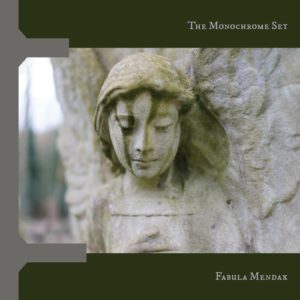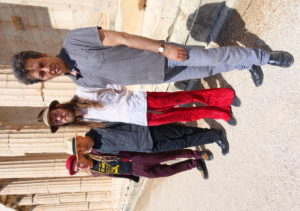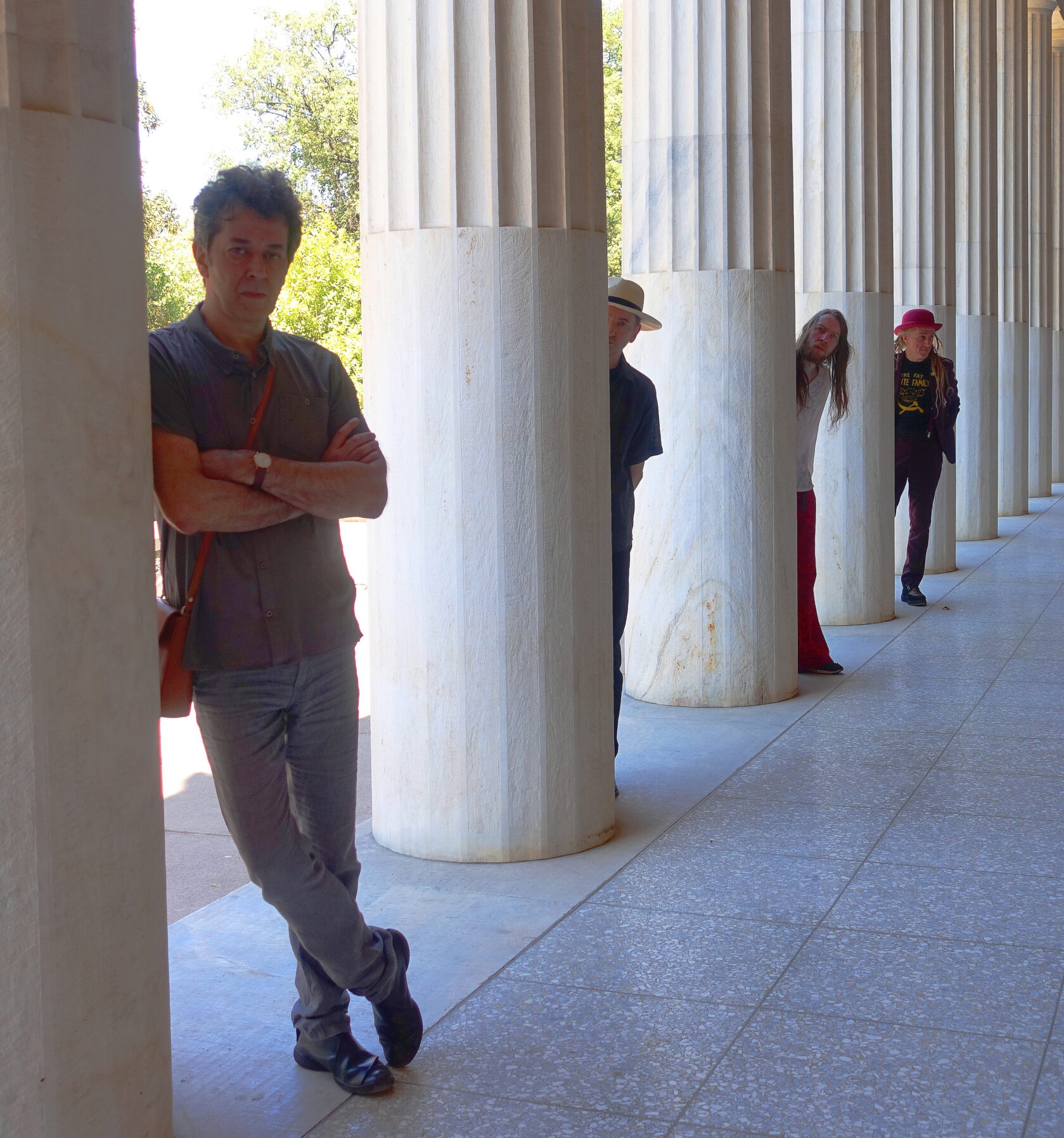The Monochrome Set, having now incredibly been in existence for more than 40 years, release the splendid historic tale Fabula Mendax on 27th September and it’s a corker, right up there with their best. Their brilliant, perhaps even genius, frontman Bid sat down to talk music, Metz and internal monsters…
God Is In The TV: I’d never heard of Armande de Pange before this album. Is she real, or were you taking artistic licence?
Bid: No, no, she IS real, but the name that she is…it’s a bit complicated. ‘Fabula Mendax’ means “twisted fable” or that kind of thing – it’s a phrase from an old Latin poem, which is actually in the manuscript, but that name is a pseudonym which she used, and no-one knows what her real name is. So, Pange is a village near Metz, which is to the far North East of France, not too far from Luxembourg and the border. It’s about 70 kilometres from Lorraine, where Joan Of Arc came from, and the manuscripts were found in Metz, clearly written after the events of Joan and her burning and all that business. So this woman, she wrote various things – and the mere fact that she could actually write meant that she was obviously quite well educated…the fact that she quoted Latin and stuff. There were a lot of women at the time who wrote about Joan Of Arc, as some sort of noble woman – there was one who wrote a big, long poem about her while she was still alive – I can’t remember her name though – but if one delves into the history, there’s quite a lot of literature about it, and it’s interesting to know that there were actually quite a lot of female warriors.
Is that what drew you to the story most?
Bid: That and the mere fact that some friends of friends of my wife’s family – because my wife comes from Metz – just had these documents, and they had a whole load of other documents at the time too. And of course Joan Of Arc is very, very big in Lorraine, which was one of the major cities…in fact Metz is one of the two oldest cities in France other than Paris, though at the time it wasn’t even IN France – it was just over the border in the Holy Roman Empire. She clearly almost certainly came from Metz, and ‘Armande’, although we think of it as a fairly normal French name, it’s actually from the German meaning “male warrior”, and then she obviously just took this name, and ‘Pange’ is a tiny village to the South West of Metz – at the time it was just a burnt out castle. So she just picked up this name and kinda went – not searching for anything particularly – travelling away from Metz for reasons not exactly clear, fleeing from her family or something like that, just sort of wandering around, which a lot of people seemed to do in those days. I mean, she obviously had a bit of money to be able to do it, and she just met up with Joan, or, from a distance, just followed her, and the rest of the tale is kinda put together from there. She herself used the phrase “Fabula mendax”, so she must have read…I think in those days the literature was…if you wanted to read books, you were almost confined to reading old Roman or Greek ones, so there wasn’t really anything there from Christian texts. So if you were educated, that’s pretty much what you knew. It’s just a fascinating story, with all the escapades she got up to, but the only song which is specifically about Joan is the last song, ‘La Chanson de Pucelle‘.

…which is an amazing song. I mean, while your records often amuse, you do still have the capability to create gigantic sounding, romantic epics like that. How does it feel when you hear a track like that back for the first time?
Bid: I’m extremely happy about it, because I think it’s the best poem ever written! (laughs) Even if I do say so myself, I think it’s just…I mean, I’m not saying “My God, I’m brilliant!” or anything but…no, actually I DO think I’m brilliant! I found that the whole concept, and just ending on that song worked incredibly well and all those strings…. It’s just sort of the technology – we’ve been working with real instruments all this time – I mean, they ARE real instruments, but I mean like rock instruments – and I worked with digital stuff and midi stuff and whatever, like years ago when I was in a band called Scarlet’s Well and then we got The Monochrome Set together and it was all just guitars and bass and stuff, but on this album I wanted to use a whole load of other things. So some of them are digital, but I didn’t want to use brass, because we did that on the last album and this time I just fancied having real strings. The sound engineer plays cello, and in the opening part we had a piano player and a violin player, and I wrote those parts on guitar – I put them into midi, then he tweaked them a bit, the sound engineer, so we just printed them off and got the players in, and it just sounded fantastic.
I know it sounds a bit wet to say this, but that song actually brought tears to my eyes…
Bid: It kind of does with me as well! I mean, the only reference point I had was John Cale‘s stuff on Chelsea Girl by Nico – that’s very much a standard chamber orchestra kind of thing, and I can’t write like that, you know, I just have to write it on guitar, so it ends up sounding like…the strings are almost like what you see…hear…on a 60s US Western.
Funny you should say that, because in my notes I wrote down that it reminded me of Marty Robbins and the old American Westerns…
Bid: That’s really really good, I mean to be honest I can even hear Doris Day singing it in Calamity Jane! It’s just got that American feel, from Bonanza or something like that, and it’s just not the kind of thing that you’d normally have on a song like that. It just works really well, and the Americans would have it just very lightish and melodic.
And there’s other things, like on ‘Sliding Icicle‘, it reminded me of George Thorogood…
Bid: That’s kind of the references, like, who’s that really old slide player? The black guy who played slide a lot, from the fifties of something? (NB – I’m presuming Bid meant Elmore James or Muddy Waters here, not Blind WIllie Johnson as I suggested at the time) Anyway, doesn’t matter, that’s what I always used to listen to, and I still do. It’s just, obviously, on our songs, the lyrics are very, very English, but the music has a large cut of Americana in it. People like Ogden Nash, they were the greatest lyricists really. And generally, the American musicals are incredible – they put such craft into such simple little pop songs, like ‘Puttin’ On The Ritz‘ – just incredible craft, putting all those words together the way they would roll off the tongue. Then you get the combination of English restoration poetry – so you put the two together and you end up with me!
Some of the lyrics on Fabula Mendax are my favourite ones I’ve heard in years. For example “How can one bird make so much noise with his beak?“
Bid: That’s very Fats Waller though. It’s like ‘Your Feet’s Too Big‘, you know? And I think Fats was a towering genius.
It must take you ages to come up with this stuff.
Bid: No, it just rolls off the tongue!
Do you have a particular space you like to go to? You certainly seem to like humorous bird lyrics anyway. I remember the line in ‘When I Get To Hollywood‘ a few years ago which had the line “Showed him to your mother and she never did recover from the pain, now her budgie mutters blimey now and then.”
Bid: I’ll tell you one thing about that song – I don’t know why but I just remember going into a club called New Continental in Preston, we stayed at a hotel there, and I got the flashy room…which was actually really rubbish, but anyway…I went in there and there was this plate on the table, and it had nuts on it. But I mean nuts as in nuts and bolts! And it was obvious that someone had told this bloke to make the room look really flash and he just didn’t really know what to do. That’s where the idea for that song came from. But anyway, what I tend to do is, I don’t question it – I don’t understand some of the lyrics that I write! I just let it go, because there’s something inside me that does all the lyric writing, and what you have to do is step back and let that come out – just let it flow and kind of “not wake up”, the same as when you’re on stage. If you wake up, you start thinking “Shit! What am I doing here?” and you don’t want that.
Over the years, I’ve read a lot of poetry – which people don’t seem to do so much now – and I think that comes through in my lyrics. Sometimes I look at them objectively and think “God, that’s really clever”, but I don’t think about it when I’m writing. It’s the same thing with when I wrote ‘Jet Set Junta‘ – it sounds like it’s been crafted over weeks, but I wrote the whole thing in, like, 20 minutes! It just flooded out, and it was clear to me that somewhere, in a room of my brain, some kind of creature was writing this whole thing, unbeknownst to me. I stepped back and let it write itself.
You suffered an aneurysm about ten years ago, didn’t you? Did that make it much harder to write?
Bid: No. Easier.
EASIER?!!!
Bid: Yeah, because, well, firstly, I did go through difficult periods of aphasia where I didn’t understand words or speech at all when I got tired. But what I discovered was that I would sit down and write, and during the course of when I was writing, while I would have aphasia and I didn’t understand any language, didn’t understand the words in my head, I would just carry on. And I would just look at my hand writing, and I knew that there was something else there doing it. Then at that point, this was around 2011, about the time I was writing Platinum Coils, it came to me that there was something else – a kind of alternative identity of me doing all this writing, and at certain points, it would become the priority part of my brain. It still had access to my lexicon when I didn’t, so my brain had kind of wired itself, since I was young and in my late teens, to always be the priority, no matter what happened to me. It’s a little bit like when Glen Campbell got…well, he went kind of a bit doolally, and his life, he couldn’t remember it, but he could still remember all his songs. It’s just like a separate part of you – while Rome’s burning, you still have this thing inside you which has been kept away from degradation and can still perform! I was watching my hands, and what I was writing, and it just looked like Malaysian to me, or some foreign script, and I didn’t understand a word of it, but when I relaxed a little bit, my ability to understand it came back. Since the aneurysm, the knowledge of that has freaked me to just write, and I know now when to take a step back and just let this ‘creature’ do it.
You’ve seen many folk that you’ve either played with, or been labelmates with, go on to become mega-famous over the years. When you look at those people, for example Adam Ant having that very public breakdown, and Morrissey becoming…well, I’m not exactly sure WHAT Morrissey has become, do you ever find yourself thanking your lucky stars that you kept your loyal fanbase WITHOUT finding worldwide fame (Japan excepted, perhaps)?
Bid: The trouble with Adam…he was a brilliant songwriter at the time, but then he had…has got…if not serious psychological problems, then certainly physiological ones with his brain. So he has a badly set up brain and has to take, I understand, mania pills and stuff like that. So it does happen to certain people, and he has to take these mania pills to stop him from going a bit mad, but sometimes the mania pills stop him from writing too, so that’s the way it is with Adam, and this is going back like 35, 40 years ago. It’s just the way it is. And with The Smiths, you know, sometimes when you do stuff, like Franz Ferdinand or The Smiths or whoever, and you have a particular sound which is generally repeated from one song to another – I remember listening to the second or third Smiths album, and I wasn’t really listening to other bands at the time, we were travelling around in a van then and our driver, who eventually ended up being The Smiths’ PR guy, he had a Smiths album and he played it, and every track sounded the same to me! Maybe it’s because I was brought up listening to different stuff – but anyway, when you have that sound, and that sound is successful, and all your songs have that sound, then you’re going to be really, really successful, or you can be in a band whose songs sound the same but are NOT successful, you’re gonna be really, really UNsuccessful. So we’re like halfway between the two! We’ve managed to not really age that much and haven’t really been tied to any particular sound. So even though people will say “Oh, that’s typically Monochrome Set”, we don’t exactly repeat ourselves. I think we COULD have been huge if we’d been around ten years earlier, but as soon as you got into the eighties, people wanted less width from a band. So I don’t think it was ever gonna be possible. Not with our lyrics! But yeah, I think it probably IS good that we didn’t become huge. We wouldn’t have known what to have done with it. It ruins you.
You’re one of that rare breed of bands where I end up liking best the songs on your albums that I initially liked the LEAST. I did that with ‘In A Little Village‘, which, although I reviewed its parent album favourably, I said was a ‘dirge’. I regretted that because it’s my favourite now. What’s all that about?
Bid: (laughs) I don’t know, I guess our stuff has lots of layers, and the lyrics, maybe the more you listen, the more you pick up different stuff. Then there’s the glide of the music – it’s not pushy or in your face, it’s not a Primal Scream album or anything. Maybe that’s it. ‘In A Little Village‘ was about me dying and how my wife would have coped with it. It makes you think about things, because when you do die, everything else just carries on. Most people don’t consider that. They just worry about dying, but then the older you get, more and more people start dying and you think its just weird that you’re carrying on living and they’re dead – these big names, Lou Reed and what have you, and the rest of us just carry on.
Anything you’d change about you career or life?
Bid: I can’t, really, because everything that I’ve ever done – and I would say this to everyone – you can never regret it because you can’t remember why exactly you did it! Even though you may have done something incredibly stupid, you can never regret that moment because you can never really put yourself back in that situation. You can learn not to GET yourself in the same situation again, but you can’t be in that same mind space that you were then.
I’ll tell you one thing that does get me up when I’m feeling down though, and I DO get down sometimes, and that’s hearing birds tweeting really fiercely when it’s raining really hard. Wild animals don’t care about stuff, they just want to carry on and survive.
And that’s what The Monochrome Set have done all these years – survived. You could argue that they are one of the true survivors of the music industry, never having to compromise their musical vision. Best of all though is Bid’s modesty – when I asked him what his proudest achievement was, he replied “not having a Wikipedia page!” I mean, you’ve gotta love someone like that, right?





